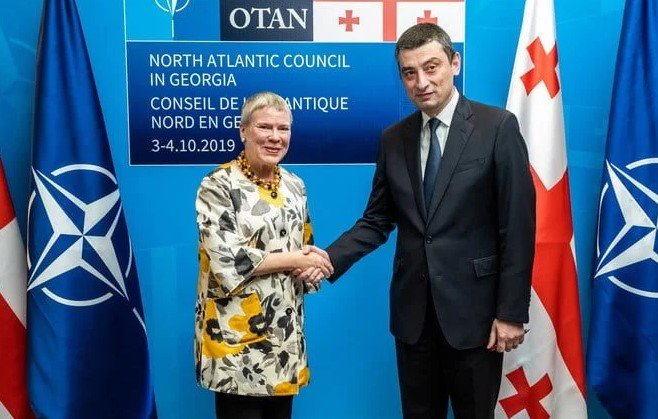In a recent statement, Giorgi Gakharia, leader of the “Gakharia for Georgia” party, expressed his concerns over the NATO summit’s omission of Georgia in the context of joining the alliance. Gakharia criticized the ruling Georgian Dream (GD) party, led by Bidzina Ivanishvili, for hindering Georgia’s Euro-Atlantic integration. He emphasized that the GD’s actions pose a direct threat to national security, leading the country towards authoritarianism and isolation. The NATO summit’s declaration called on Russia to withdraw its forces from Georgia, but did not mention Georgia’s potential membership.
Gakharia’s Concerns Over National Security
Giorgi Gakharia has voiced strong concerns regarding the national security implications of the NATO summit’s omission of Georgia. He believes that the ruling Georgian Dream party is deliberately undermining Georgia’s Euro-Atlantic aspirations. According to Gakharia, this omission is a clear indication of the GD’s failure to secure Georgia’s strategic interests. He argues that the GD’s policies are leading the country towards increased vulnerability and isolation. Gakharia’s statement highlights the urgent need for a change in leadership to protect Georgia’s national security and democratic future.
Gakharia’s criticism extends to the broader implications of the NATO summit’s decision. He asserts that the lack of mention of Georgia’s membership prospects is a setback for the country’s long-term strategic goals. This omission, he argues, reflects poorly on the current government’s ability to navigate international diplomacy. Gakharia calls for a renewed focus on strengthening Georgia’s ties with NATO and other Western allies. He believes that a more proactive approach is necessary to ensure Georgia’s security and integration into the Euro-Atlantic community.

The NATO summit’s declaration, while calling for Russia to withdraw its forces from Georgia, failed to address the country’s aspirations for membership. Gakharia sees this as a missed opportunity to reaffirm Georgia’s commitment to Euro-Atlantic integration. He emphasizes that the GD’s leadership is not only failing to advance Georgia’s strategic interests but is also compromising the country’s sovereignty and territorial integrity. Gakharia’s statement underscores the need for a more assertive and strategic approach to international relations.
Criticism of Georgian Dream’s Leadership
Gakharia’s statement includes a sharp critique of the Georgian Dream party’s leadership. He accuses the GD of deliberately sabotaging Georgia’s Euro-Atlantic integration process. According to Gakharia, the GD’s actions are driven by a desire to maintain power at the expense of the country’s strategic interests. He argues that the GD’s policies are leading Georgia towards authoritarianism and isolation. Gakharia’s criticism is rooted in his belief that the current leadership is not acting in the best interests of the Georgian people.
The GD’s approach to international relations has been a point of contention for Gakharia. He believes that the party’s policies are alienating Georgia from its Western allies. Gakharia argues that the GD’s leadership is more focused on consolidating power than on advancing the country’s strategic goals. This, he claims, is evident in the NATO summit’s omission of Georgia’s membership prospects. Gakharia calls for a change in leadership to restore Georgia’s commitment to Euro-Atlantic integration and democratic values.
Gakharia’s criticism is not limited to the NATO summit’s outcomes. He also highlights the broader implications of the GD’s leadership on Georgia’s domestic and international standing. According to Gakharia, the GD’s policies are eroding democratic institutions and undermining the rule of law. He argues that the current leadership is leading Georgia towards increased authoritarianism and isolation. Gakharia’s statement is a call to action for the Georgian people to demand better leadership and a renewed commitment to democratic principles.
Future of Georgia’s Euro-Atlantic Integration
Looking ahead, Gakharia emphasizes the importance of Georgia’s continued pursuit of Euro-Atlantic integration. He believes that the country’s future security and prosperity depend on its ability to align with Western institutions. Gakharia calls for a more proactive and strategic approach to international relations. He argues that Georgia must strengthen its ties with NATO and other Western allies to ensure its long-term security and stability. Gakharia’s vision for Georgia’s future is one of increased integration and cooperation with the Euro-Atlantic community.
Gakharia’s statement outlines a clear path forward for Georgia’s Euro-Atlantic integration. He calls for a renewed focus on diplomatic efforts to secure Georgia’s membership in NATO. Gakharia believes that the country must demonstrate its commitment to democratic values and international norms. He argues that a change in leadership is necessary to achieve these goals. Gakharia’s vision for Georgia’s future is one of increased engagement with Western institutions and a stronger commitment to democratic principles.
The future of Georgia’s Euro-Atlantic integration is a critical issue for Gakharia. He believes that the country’s strategic interests are best served by aligning with NATO and other Western allies. Gakharia calls for a comprehensive strategy to advance Georgia’s membership prospects. He argues that the country must prioritize its Euro-Atlantic aspirations to ensure its long-term security and prosperity. Gakharia’s statement is a call to action for the Georgian people to support a leadership that is committed to these goals.
